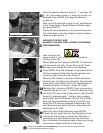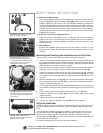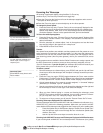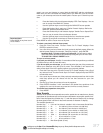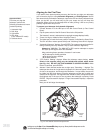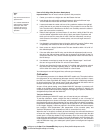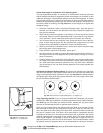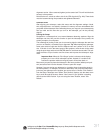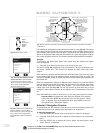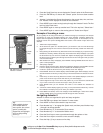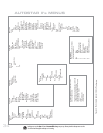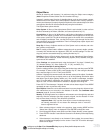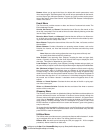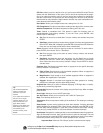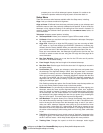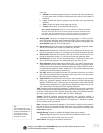
32
It is important to understand that menu selections are set in a loop (Fig. 44
).
This means
that pressing the Scroll Down key cycles down through all the available options within a
given category, then returns to the first option. The Scroll Up key cycles up through the
options in the opposite order. Note that this capability is a quick way to get to an option
that is near the bottom of the list. The following example demonstrates this capability.
Example:
To navigate to the “Select Item: Setup” menu option when the “Select Item: Object”
menu is displayed:
1. Press the Scroll Down key five times or the Scroll Up key once.
The screen in Fig. 44a displays two lines of information. The top line shows the cur-
rent menu, "Select Item." The second line displays an option within that menu,
"Object."
Some options are choices that select the next menu level down.The Scroll keys move
up and down within the list of available options, showing one option at a time. The
example in Fig. 44a shows the Select Item menu with the Object option displayed on
the second line.
When the desired option (Object) is displayed on the second line, press the ENTER
key to choose that option and move down one menu level. In the example, press Enter
and the display now reads "Object: Solar System." You have moved down to the
Object menu level. See Fig. 44b. You can now use the up and down keys to scroll
through the other options available for the Objects menu: Constellations, Deep Sky,
etc.
Press the MODE key to leave a menu level;
e.g.,
the wrong menu option is chosen.
Important Note: No matter how many levels into Autostar II are traveled,
each press of the MODE key moves up a level, until the top level, "Select
Item," is reached. Once in the Select Item level, press MODE to return to
the topmost level, "Select Item: Object."
Autostar II Navigation Exercise
To demonstrate how the Autostar II menu structure works, the following exercise cal-
culates Sunset time so an evening observing session can be planned.
To Calculate Sunset time:
1. Press the MODE key several times, until “Select Item: Object” is displayed.
2. Press the Scroll Down key once to display the “Event” option in the “Select Item”
menu.
3. Press the ENTER key to choose the "Event" option and move down a level.
"Event: Sunrise" is displayed..
BASIC AUTOSTAR II
Select Item:
Setup
Select Item:
Utilities
Select Item:
Glossary
Select Item:
Guided Tour
Select Item:
Event
SETUP MENU
Automatic alignment
permits all telescope
operations with only
minimal setup.
UTILITIES MENU
Calculate eyepiece
magnifications;
set timer alerts;
create your own
landmark survey.
GLOSSARY
What is an elliptical galaxy?
How far away is the Sun?
Expand your knowledge of
astronomy by displaying terms
and definitions, and other information.
OBJECT MENU
Want to see Mars? The Orion nebula?
The Andromeda galaxy? Select from
over 180,000 objects and press
GO TO to move the telescope
automatically to an object.
EVENT MENU
Display the time of
past, present, and future
astronomical events,
such as Moon phases
or meteor showers.
GUIDED TOUR
Autostar II escorts you
on a tour of tonight's
best celestial objects
at your viewing location.
Select Item:
Object
A
utostar I
I
The Universe of
Autostar Iutostar I
I
Fig. 45: The Autostar II Universe: The six primary categories listed in the Select Item menu
of Autostar II.
Object
Event
Guided Tours
Glossary
Utilities
Setup
Event
Guided Tour
Glossary
Utilities
Setup
Select Item
Objects
Fig. 44a:The menu displays on the
top line and Menu options display
on the second line. Use the Scroll
keys to move up or down through the
list of options. Press ENTER to
select the desired option.
Constellations
Deep Sky
Star
Satellite
User Objects
etc.
Objects
Solar System
Fig. 44b: Object menu is selected by
pressing ENTER. Use the Scroll
keys to move up or down through the
list of options for the Object menu.
Press ENTER to select the desired
option.
Fig. 43: Menus set in a loop.
Looking at or near the
Sun
will cause
irreversible
damage to your eye. Do not point this telescope at or near the
Sun. Do not look through the telescope as it is moving.



